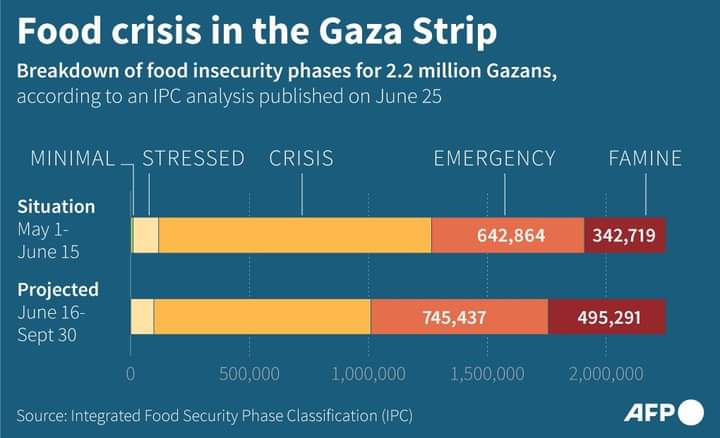
Article | Chourouk Mestour
After ten months of war in Gaza, the issue of food availability has emerged as a prominent concern that requires attention. The blockade imposed on the city, the extensive destruction of infrastructure, and the closure of humanitarian aid routes have significantly exacerbated the food crisis. The focus has shifted to who is responsible for providing adequate and nutritious food to those affected by the conflict, amidst Israel’s refusal to comply with international law principles.
According to the 1996 World Food Summit, food security is defined as a situation where all people, at all times, have physical and economic access to sufficient, safe, and nutritious food to meet their dietary needs and preferences for an active and healthy life. However, the concept of food security changes significantly during periods of war and crises compared to normal times. Under blockade and restrictions, providing basic meals, or even one healthy meal a day, becomes a challenging task.
In times of war, food becomes a scarce commodity, especially under blockade conditions, making comprehensive and nutritious food alternatives unavailable. The priority shifts to ensuring access to the minimum required food for survival, regardless of optimal health specifications. In the Gaza Strip, all residents suffer from high levels of acute food insecurity, classified as Phase 3 (Crisis), Phase 4 (Emergency), or Phase 5 (Catastrophe) according to the Integrated Food Security Phase Classification. This includes approximately half of the population, or about 1.11 million people experiencing catastrophic food insecurity. The Government Media Office in Gaza has reported that humanitarian aid has not reached Gaza and North Gaza Governorates for over two months. Cindy McCain, Executive Director of the World Food Programme, stated that “people in Gaza are now starving to death. The speed at which the hunger and malnutrition crisis—man-made—has spread in Gaza is terrifying.”

According to international humanitarian law, each party in an armed conflict is fundamentally responsible for ensuring that the basic needs of the population under its control are met, including the provision of adequate food and water supplies. International humanitarian law absolutely prohibits the starvation of civilians as a method of warfare. Neutral humanitarian organizations have the right to offer their services to carry out humanitarian activities, even when one party is unable or unwilling to meet these needs. Under the law, a party to the conflict cannot arbitrarily or illegally withhold consent for such offers; once consent is granted, the parties to the conflict and all concerned states must allow and facilitate the rapid passage of humanitarian relief without obstruction.
The people of Gaza have the right to urgent international support to achieve food security and avoid a humanitarian disaster. However, in light of Israel’s refusal to comply with international humanitarian law, the international community must take urgent and effective measures to ensure that humanitarian aid reaches those in need in Gaza. Additionally, international organizations, including the United Nations, must fulfill their responsibilities and provide the necessary assistance without delay.
Chourouk Mestour
Researcher and PhD Candidate in International Relations
Holder of a Master’s Degree in Security and Strategic Studies
Author of several published articles and studies in the fields of security and international policies
